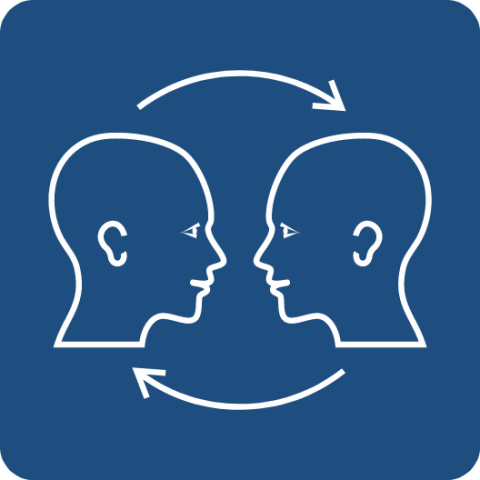About Aphasia awareness
More than 350,000 people in the UK have aphasia, a disorder of language and communication.
Aphasia can affect a person's ability to understand, speak, read, write and use numbers, however it doesn't affect a person's intelligence.
One of the biggest challenges for people affected by aphasia is that many people don't know enough about it or how they can help. Better awareness of the condition and the right communication tools can make all the difference.
The Communication Access Symbol
The Communication Access Symbol has been developed to enable people with communication difficulties to identify businesses whose staff members are trained in communication support.
Anyone, including private individuals, can voluntarily sign up for free accredited training on the Communication Access UK website.
Companies with staff who have successfully completed the training will be added to the 'Communication Accessible' national directory and can display the Communication Access Symbol on their premises.


The Communication Access Symbol is an initiative of Communication Access UK: an alliance of charities and organizations - led by the Royal College of Speech and Language Therapists and including the Stroke Association - that share a vision to improve the lives of people with communication difficulties.
Ask. Wait. Listen
We asked people with aphasia what you can do to help them communicate. Using what they told us, we created a video and a postcard providing aphasia etiquette tips.
To help raise awareness about aphasia, our supporters have been distributing 'Ask. Wait. Listen' postcards to local shops and Health Centres. These postcards have helped raise awareness and have given staff tips on communicating with customers who have aphasia.
Tom's story

At the time of his stroke, Tom thought he was talking but nobody seemed to understand what he was saying. He felt helpless and scared.
Eventually, he was able to communicate, but it took time. He used a pen and paper at first to write down what he wanted to say. Reading books and letters was a problem and he found writing certain words difficult.
He says: “Coming home made me realise just how much my life had completely changed. Everything was different: physically, emotionally and financially. I found myself going into deep depression.
“Shopping was a challenge. I found numbers hard to understand. For example, if I was given £4.50 change from a tenner, I couldn’t work out what that amount meant. It made me feel stupid.”
Over time, Tom made a good recovery. His family, friends, therapists and the Stroke Association helped him rebuild his life again.
“I would encourage everyone to seek help. Find information, get advice and use the tools and services from charities such as the Stroke Association to help you with your recovery. It’s vital.”
Please donate today. Thank you.
